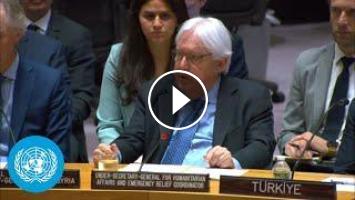Briefing by Martin Griffiths, Under-Secretary-General for Humanitarian Affairs and Emergency Relief Coordinator, on the humanitarian situation in Syria.
"Thank you, Mr. President.
Since I assumed the role of Emergency Relief Coordinator almost three years ago, I have spoken
to you numerous times in these monthly sessions on the humanitarian situation in Syria.
I am grateful for the opportunity to speak to you today in one of my last briefings to the Council.
Mr. President,
My involvement in the UN response to the Syrian crisis goes back almost to the start of the
conflict, when I served three UN Special Envoys and the Deputy Head of the United Nations
Supervision Mission in Syria (UNSMIS) between 2012 and 2014.
By the time I was appointed as Emergency Relief Coordinator, the humanitarian emergency had
been raging for more than a decade.
During my time in office, I visited Syria four times – more than any crisis – reflecting the
severity of the crisis and the desperate need for solutions.
Three years later, as I prepare to step down, it pains me that the suffering of the people of Syria
grinds on. More people need humanitarian assistance than at any time in the conflict – 16.7
million on the latest assessments.
Syria remains a protection crisis. Children continue to be killed, women and girls continue to
fear for their safety and across Syria, more than 7 million people remain displaced, a figure
surpassed only by Sudan. Millions of others continue to live as refugees in neighboring countries
and beyond.
Mr. President,
A recurring issue in my briefings over the years has been the importance of sustained access –
through all modalities, whether cross-border or cross-line.
Since 2014, the cross-border operation from Türkiye has provided a lifeline to millions of people
in need in north-west Syria. Following the lapse of the Security Council’s authorization for the
operation, it continues to function effectively under the consent of the Government of Syria.
I welcome the recent decision of the Government of Syria to extend its permission for the use of
the Bab al-Salam and Al Ra’ee border crossings for an additional three months, until 13 August
2024.
I hope permission to use the Bab al-Hawa crossing will likewise be extended beyond 13 July, and
that consent for the use of all crossings will be provided for as long as humanitarian needs persist.
As I have emphasized repeatedly, cross-line deliveries are also a critical tool for reaching people
in need throughout Syria.
Cross-line deliveries to the north-west remain more challenging than they should be.
We have now gone nearly one year without such a mission.
But I am encouraged by signs that mission could go ahead in the coming days, and hope it will
generate crucial momentum for more regular deliveries.
I am also encouraged – thanks to several weeks of effort and a show of commitment by all parties
– by the cross-line assessment mission to the Alouk water station on 21 May.
The water station has been out of operation since 5 October last year when multiple airstrikes in
the north-east damaged the electricity network. As the main water source for more than 610,000
people in Al-Hasakeh Governorate, it is critical that its operation is restored ahead of the coming
summer months. As a direct consequence of the severe water, fuel and electricity crisis, women
are struggling to meet their menstrual hygiene needs, and malnutrition rates have risen
dramatically.
Mr. President,
Another issue that has far too frequently been the subject of our discussions is the protection of
civilians.
Although the level of hostilities has thankfully subsided from its peak, fighting continues as a
reality in the lives of many Syrians.
Syrian women and girls continue to be exposed to negative coping mechanisms and appalling
levels of gender-based violence including sexual violence, exploitation, and abuse.
Daily fighting – at its fiercest in north-west Syria – continues to cause civilian injury and death,
including children.
And it continues to harm the humanitarian response.
A recent uptick in hostilities in Deir-ez-Zor Governorate in eastern Syria, in very close proximity
to the UN hub and other humanitarian premises, damaged humanitarian assets and led to the
temporary suspension of humanitarian operations.
Allow me to reiterate what you have heard from me repeatedly over the past three years: all parties
to the conflict must respect international humanitarian law.
This includes taking constant care to spare civilians and civilian objects, including humanitarian
personnel and their assets, in the course of military operations.
It also includes allowing and facilitating the rapid and unimpeded passage of humanitarian relief,
and ensuring humanitarian workers the freedom of movement to perform their work..."
"Thank you, Mr. President.
Since I assumed the role of Emergency Relief Coordinator almost three years ago, I have spoken
to you numerous times in these monthly sessions on the humanitarian situation in Syria.
I am grateful for the opportunity to speak to you today in one of my last briefings to the Council.
Mr. President,
My involvement in the UN response to the Syrian crisis goes back almost to the start of the
conflict, when I served three UN Special Envoys and the Deputy Head of the United Nations
Supervision Mission in Syria (UNSMIS) between 2012 and 2014.
By the time I was appointed as Emergency Relief Coordinator, the humanitarian emergency had
been raging for more than a decade.
During my time in office, I visited Syria four times – more than any crisis – reflecting the
severity of the crisis and the desperate need for solutions.
Three years later, as I prepare to step down, it pains me that the suffering of the people of Syria
grinds on. More people need humanitarian assistance than at any time in the conflict – 16.7
million on the latest assessments.
Syria remains a protection crisis. Children continue to be killed, women and girls continue to
fear for their safety and across Syria, more than 7 million people remain displaced, a figure
surpassed only by Sudan. Millions of others continue to live as refugees in neighboring countries
and beyond.
Mr. President,
A recurring issue in my briefings over the years has been the importance of sustained access –
through all modalities, whether cross-border or cross-line.
Since 2014, the cross-border operation from Türkiye has provided a lifeline to millions of people
in need in north-west Syria. Following the lapse of the Security Council’s authorization for the
operation, it continues to function effectively under the consent of the Government of Syria.
I welcome the recent decision of the Government of Syria to extend its permission for the use of
the Bab al-Salam and Al Ra’ee border crossings for an additional three months, until 13 August
2024.
I hope permission to use the Bab al-Hawa crossing will likewise be extended beyond 13 July, and
that consent for the use of all crossings will be provided for as long as humanitarian needs persist.
As I have emphasized repeatedly, cross-line deliveries are also a critical tool for reaching people
in need throughout Syria.
Cross-line deliveries to the north-west remain more challenging than they should be.
We have now gone nearly one year without such a mission.
But I am encouraged by signs that mission could go ahead in the coming days, and hope it will
generate crucial momentum for more regular deliveries.
I am also encouraged – thanks to several weeks of effort and a show of commitment by all parties
– by the cross-line assessment mission to the Alouk water station on 21 May.
The water station has been out of operation since 5 October last year when multiple airstrikes in
the north-east damaged the electricity network. As the main water source for more than 610,000
people in Al-Hasakeh Governorate, it is critical that its operation is restored ahead of the coming
summer months. As a direct consequence of the severe water, fuel and electricity crisis, women
are struggling to meet their menstrual hygiene needs, and malnutrition rates have risen
dramatically.
Mr. President,
Another issue that has far too frequently been the subject of our discussions is the protection of
civilians.
Although the level of hostilities has thankfully subsided from its peak, fighting continues as a
reality in the lives of many Syrians.
Syrian women and girls continue to be exposed to negative coping mechanisms and appalling
levels of gender-based violence including sexual violence, exploitation, and abuse.
Daily fighting – at its fiercest in north-west Syria – continues to cause civilian injury and death,
including children.
And it continues to harm the humanitarian response.
A recent uptick in hostilities in Deir-ez-Zor Governorate in eastern Syria, in very close proximity
to the UN hub and other humanitarian premises, damaged humanitarian assets and led to the
temporary suspension of humanitarian operations.
Allow me to reiterate what you have heard from me repeatedly over the past three years: all parties
to the conflict must respect international humanitarian law.
This includes taking constant care to spare civilians and civilian objects, including humanitarian
personnel and their assets, in the course of military operations.
It also includes allowing and facilitating the rapid and unimpeded passage of humanitarian relief,
and ensuring humanitarian workers the freedom of movement to perform their work..."
- Category
- United Nations
- Tags
- UN, United Nations, UNGA
Be the first to comment













